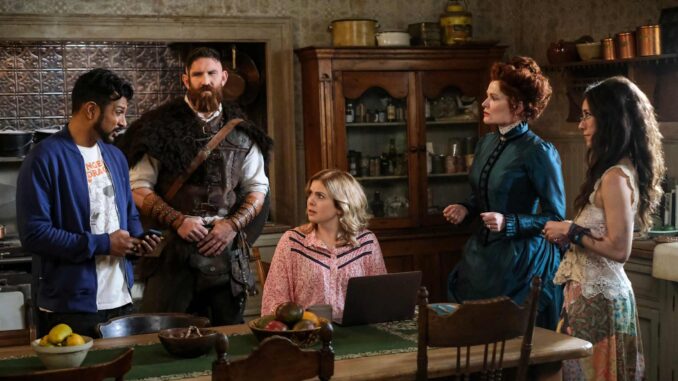
Five Reasons Isaac Higgins Should Finally Flee the Haunted Halls of Button House
The ethereal residents of Button House, the hilariously haunted home at the heart of the BBC sitcom "Ghosts," are a delightful tapestry of historical hangups. They’re funny, endearing, and undeniably stuck. While the show’s charm lies in their inability to move on, perpetually tethered to the earthly realm, there's one specter who could particularly benefit from crossing over: the pompous, repressed, and undeniably pathetic Captain Isaac Higgins. For the sake of his happiness, his character development, and even the overall narrative of the show, it's time for Isaac to finally find his way to the "light."
Firstly, Isaac's self-imposed torment is becoming increasingly grating. Initially, his closeted homosexuality in a rigid 18th-century setting was a source of poignant humor. His internal battles, masked by layers of rigid decorum, resonated with a sense of historical tragedy. However, after several seasons, his perpetual wallowing in repressed desire and societal constraint has begun to feel stagnant. He’s learned about modern acceptance, witnessed love in its diverse forms through the living residents of Button House, and even tentatively dipped his toes into romantic relationships. His continued self-flagellation, while understandable considering his background, now feels less tragic and more frustrating, hindering his personal growth and the potential for genuinely heartwarming storylines. He deserves a chance to escape the prison of his own making and find peace beyond the constraints of Button House.
Secondly, his departure could unlock new and fascinating narrative avenues for the remaining ghosts. Isaac’s constant presence often dominates storylines, especially those involving romantic relationships or explorations of historical prejudice. While these plots are valuable, they often overshadow the other ghosts, whose unique perspectives and personal demons are equally deserving of exploration. Without Isaac's omnipresent anxieties, the writers could delve deeper into the backstories of Mary, Julian, or even the stoic Robin. His absence would create a void, forcing the other characters to confront their own emotional baggage and providing space for fresh, engaging storylines.
Thirdly, allowing Isaac to find peace would demonstrate a powerful message of hope and healing. "Ghosts" is, at its core, a show about connection, acceptance, and finding common ground. To deny Isaac the opportunity to move on would send a mixed message, suggesting that some historical wounds are simply too deep to heal. By allowing him to overcome his internal struggles and find solace, the show could offer a powerful message of resilience and the possibility of transcending even the most deeply ingrained societal prejudices. It would reinforce the idea that even the most haunted souls can find peace and liberation.
Fourthly, it would be a satisfying culmination of his character arc. Isaac's journey throughout the series has been one of gradual self-discovery and acceptance. He’s moved from staunch denial to tentative exploration, fostered genuine friendships, and even experienced fleeting moments of happiness. While he still clings to aspects of his past, he’s undeniably evolved. Allowing him to finally move on would provide a fitting conclusion to this arc, demonstrating the transformative power of time, understanding, and human connection. It would be a powerful moment of catharsis, both for Isaac and for the audience who have invested in his journey.
Finally, the element of surprise is crucial for a show built on repetition. While the recurring jokes and character dynamics of "Ghosts" are part of its charm, the formula risks becoming predictable. Allowing one of the core ghosts to finally move on would shake up the established order, injecting an element of uncertainty and intrigue into the narrative. It would force the remaining characters to adapt to a new reality, potentially forging new alliances and exploring previously unexplored dynamics. This disruption would not only keep the show fresh and engaging but also reaffirm that even in the seemingly static world of Button House, change is possible.
In conclusion, while the prospect of losing Isaac Higgins from the haunted halls of Button House may seem daunting, it's a necessary step for the character's growth, the show's narrative evolution, and the delivery of a powerful message of hope and healing. By finally allowing Isaac to find his peace and move on, "Ghosts" could not only deliver a satisfying conclusion to his story but also breathe new life into the series, proving that even the most stubbornly anchored spirits can ultimately find their way to the light. It's time for the Captain to embark on his final, and most important, voyage: a journey towards lasting peace.